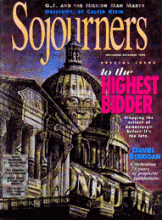Memory sifts between past events in ways that focus toward a dream nourished with hope, or a nightmare invested with power.
-Robert McAfee Brown (from "Rethinking Our Histories," in New Visions for the Americas, edited by David Batstone; Fortress, 1993)
One of the most important actions U.S. missionaries in El Salvador took in the Salvadoran civil war was simply to tell the truth about what was going on, especially regarding the effects of their own government's policies. Three recent books written by U.S. missionaries who have accompanied the Salvadoran church in its struggle for justice continue this process: Promised Land: Death and Life in El Salvador, by Scott Wright; Vultures and Butterflies: Living the Contradictions, by Susan Classen; and The Harvest of Justice: The Church of El Salvador Ten Years After Romero, by Daniel Santiago.
Most of the stories in Promised Land
were familiar, whether through firsthand telling or Scott Wright's many articles and newsletters. His experiences in El Salvador cover the whole sweep of the war from 1980 through the 1992 Peace Accords. I know of no one with more varied experiences of the Salvadoran church than Scott Wright; he lived with the refugees in Honduras, accompanied pastoral workers for several years in the war zones of Chalatenango and Morazan, and was part of the pastoral teams in a number of poor parishes in San Salvador.
Read the Full Article
